Apple Cider Vinegar (ACV) for chickens has had some very good press over the last ten years. There has been lots of research done where ACV has been added to one group of chicken’s water and the compared against the other ‘control’ group.
Cider Vinegar for chickens is acidic and it is this acidity that means ACV is a mild anticeptic and will kill a number of germs. In addition to this, it is claimed to act like a mild antibiotic. Antibiotics kill infectious bacteria that can cause disease in chickens.
In addition to these benefits, Apple Cider Vinegar is full of vitamins, minerals and trace elements that are beneficial to your chickens but you do have to be careful where you buy ACV from – don’t go rushing off to Tesco just yet!
Apple Cider Vinegar has been proven to help chickens with stress which is one of the main contributors to their immune system lowering and letting in disease. I use ACV during the following times:
- Moving house
- Introducing new birds
- If snow falls on the ground (a stressful change in environment for chickens)
- After a fright – eg fox attack
- After injury
- Once per month for a week for the health benefits
You can buy ACV from Amazon
Dillution Rate of Apple Cider Vinegar
ACV should be dilluted at a rate of 2% in fresh drinking water. This is the same as saying 20ml in every litre. Make sure you are using plastic water containers because it is acidic and will corrode galvanised containers. The normal rate at which to give to chickens in order to be beneficial is for one week per month. If you choose the first week of every month, it will be easier to remember. Chicks and growers can be given 0.5% ACV in water or 5ml per litre.
Do you have any information on Apple Cider Vinegar? Please leave me a comment below.

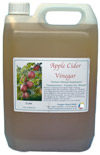
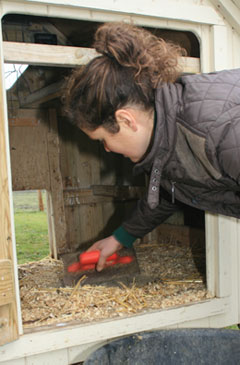
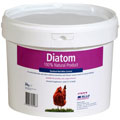
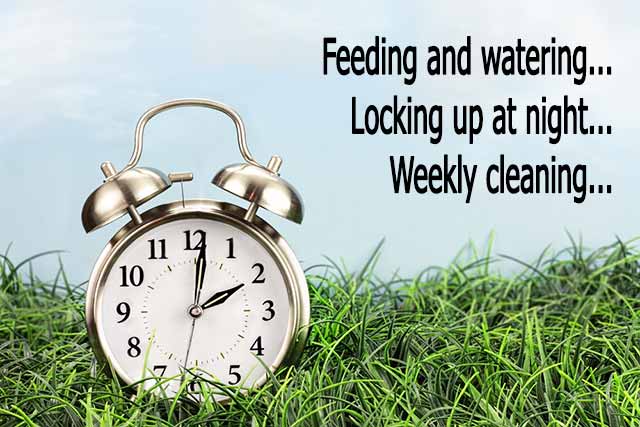

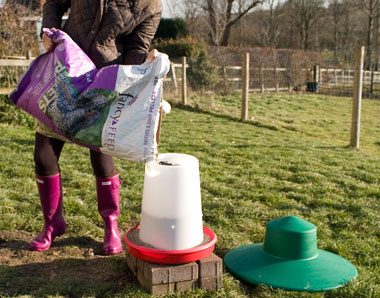
I am looking after someone’s chicks. She has asked me to give them vinegar diluted in water every 4 or 5 days. 70ml in 1 liter. To put it in their reservoir and then top it up with fresh water as needed. Is this correct? Will they drink so much water in 4 or 5 days? I’m afraid to give them too much of the vinegar solution.
They must have fresh water at all times so you should really change it daily or at least every other day. Assuming the vinegar you speak of is ACV then the dose is a little high although its natural and won’t hurt them. I would do what the owner wants unless they won’t drink the water or something in which case I would reduce the dose to 20ml per litre.
I am using the nipple water system (I have a bucket of water hanging from the top of the run with nipples screwed into the bottom of the bucket) there are metal parts to this system (very small but still..) the bucket itself is plastic. Does this mean I can’t use ACV at all for my chickens? Incidentally, we dump the old water at the end of each day, turn the bucket upside down to drain and store it in a closed shed until the next morning when we fill it up with fresh water for the chickens for that day.
ACV is an acid so will eat into and react with the metal. A plastic drinker is the only solution…
We have moved to France and for the first time ever I am the proud owner of 6 Sussex hens, bought 2 weeks ago and approx. 6 weeks off laying. I’ve been looking at your site and found it very informative, although some of it makes things look a bit daunting! We have them in a breeze block house, with old tea chests as nest boxes, in a concrete run with a gate into a grassy run with a small rockery, bamboo, weeds, etc. This outside run is permanent but I’ve noticed your comments re. worms and changing the run area. This would be difficult. Also as yet I have been unable to find anywhere here to buy things like wormer, etc so I may have to talk to other poultry owners. However I do have in the kitchen some Vintage Cider Vinegar – can I use this to dose the hens? Also one of the hens is slightly off-colour – she seems to doze a lot, is smaller than the others, which have put on weight since we got them, and she seems to have either a cough or sneezes, with occasionally bubbles coming from her ‘nostrils’. Some days she’s out with the others, other days she sits inside on her own. Any suggestions??
Well firstly, I hope you have fun in France. Jeremy Hobson is a well known poultry author who also lives in France and I know there are several members of poultrykeeperforum.com who also live in France.
From what I have heard most poultry keepers in France tend to buy their supplies from the UK once in a while. Many companies will ship to Europe. The local veteriniere will have other products that can be used for worming (ivermectin based is the norm I believe) but do make sure you follow the suggested withdrawal period or ask what they use for commercial hens in France. If you can just buy Flubenvet in the UK, that would probably work out cheaper though.
Apple Cider Vinegar must not be pasturised to have the heath benefits – chances are yours isn’t and it wouldn’t hurt your hens even if it is pasturised, however this is not a replacement for a wormer. It may help but won’t cure a hen with worms.
Chickens, being predated upon in the wild have learned to hide illness well until suddenly they are really sick… I would take a guess at this being Mycoplasma Gallisepticum and the symptoms you describe being a secondary infection in the upper respiratory tract as a result of this disease. There is a lot of information on this sort of thing on the poultrykeeper.com website in the diseases>respiratory section. It is a fairly common disease amongst back yard flocks.
I would give them fresh crushed garlic cloves in their water (again, good article on poultrykeeper.com on garlic) and if she gets any worse, seek veterinary advice, although the attitude towards poultry in France is somewhat different and you may find it hard to find a vet who can treat poultry. Tylan is the antibiotic that is often prescribed to relieve these symptoms although be careful with using antibiotics, there is a lot of concern over antibiotic resistance.
I put a few drops of cider vinegar in my hens water every time I change it. Is this ok ?
I buy the “human” cider vinegar from the supermarket but notice you advocate a different variety. Is the supermarket stuff not correct?
Yes, I don’t see why you can’t add it every time.
The supermarket variety has been heat treated / pasteurised – this kills off the useful bacteria. You can buy ACV for Chickens online or at equine shops (also sold for horses).
Tesco sell Aspall’s unpasteurised ACV – and while not cheap (and lacking any mother than I could see) it’s just as effective as the stuff you can get at the farm stores. The unheated stuff will also retain more of the useful vitamins which can be destroyed by heat treatments.
What a fantastic article, I stumbled on this quite by chance!
We actually keep 3 Chooks and I think they will be getting a dose of Apple Cider Vinegar. Strange thing is, I actually drink Apple Cider Vinegar and Honey with hot water, something I picked up from ‘Dick Proenneke’ Who lived in Alaska for 30 years alone!
I digress, what a fantastic read!
Andy